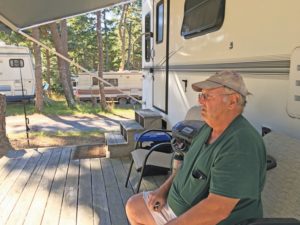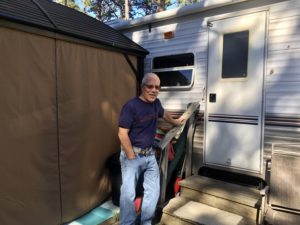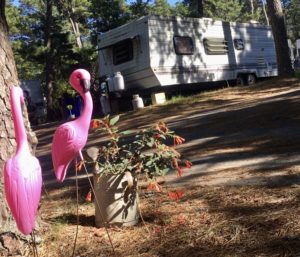WELLFLEET — The details of a proposal that the town buy Maurice’s Campground as a site for community housing continued to change in the days leading up to the Sept. 10 special town meeting when voters will face the $6.5 million proposition. The question of whether the board of health would allow 35 cesspools to remain in operation for the next six years is now off the table.

The sellers have asked the town to keep running Maurice’s as a campground to keep their tenants happy. Because cesspools are illegal and must be upgraded upon the sale of a property, housing advocates and the select board had asked the Wellfleet Board of Health for a waiver of septic rules. Health board members were not pleased with the request.
But on Tuesday, Sept. 6 town officials learned that the campground’s wastewater volume of over 10,000 gallons a day means the state Dept. of Environmental Protection, rather than the local board of health, would have to approve the continued operation of the cesspools. The campground has been in violation of DEP rules banning cesspools since 2005, said Town Administrator Rich Waldo.
A last-minute compromise — to ask for a four-year rather than a six-year waiver of the rules — that was devised for the board of health’s Sept. 7 meeting will now be presented to the DEP instead.
“This is not bad,” Waldo said. “Now the local board won’t be put in a tough position.”
The hard part, Waldo added, is that the DEP cannot say how long it might allow the cesspools to operate before the town meeting vote on Saturday.

“MassDEP can’t allow operation of the campground to continue as is without a reasonable timeline towards compliance and some intermediate mitigating measures,” DEP spokesman Edmund Coletta told the Independent. “But we do expect to work with the town to incorporate this issue into their Targeted Watershed Management Plans (TWMP) for Wellfleet Harbor.”
Special town meeting voters will be asked to buy the 21-acre campground for $6.5 million to create affordable and workforce housing.
John Gauthier, one of three brothers who own Maurice’s, said they want to avoid suddenly displacing their longtime clients, including 50 to 60 seasonal employees of Outer Cape businesses and nonprofits who live there.
In the proposed compromise, after four years the town would install a new waste treatment system that would serve the property for two more years as a campground and then serve the community housing complex to be built there. The timeline includes beginning the housing development “public process” in October 2025 and having a contractor install phase one of a treatment system by July 2026.
“We are seeing if we can put something in the ground before six years,” Waldo said.

The next step, Waldo said, is to ask the Gauthiers to change the terms of the purchase and sale agreement so that it allows the town to continue operating it with cesspools as long as the DEP allows it.
Negotiations could continue after town meeting. The hard deadline for reaching an agreement is the scheduled closing on Oct. 31. Even then, the proponents of the plan could request an extension, said Kathleen Nagle, a member of the town’s Maurice’s Campground working group.
The select board’s proposal offers assurances that the campground’s two wells and groundwater will be monitored for contamination while the cesspools remain in use. The wells have maintained consistently good water quality for 20 years despite the presence of the cesspools, as measured by monthly tests required by the state DEP. There were two outlier high readings in 2019 (7.7 mg/l and 9.7 mg/l) that came close to the 10 mg/l allowable maximum for nitrates. Under town ownership, testing will continue to be done monthly, according to Waldo.
The town also plans to conduct a full sanitary inspection of the 35 cesspools. The $35,000 to $50,000 cost for this and other monitoring would come from the $202,000 in American Rescue Plan Funds that Wellfleet will receive, according to the select board.
Meanwhile, Wellfleet could begin envisioning the campground’s future and issue a request for proposals from developers of affordable housing. Harry Terkanian, of the Maurice’s Campground working group, said people need to understand the town doesn’t pay to build housing. The town’s contribution is the land; a developer takes on the rest.
Town meeting voters will also decide if they should apply $645,000 in community preservation funds to the campground purchase. This would involve reserving a three-acre parcel for residents earning 100 percent or less of area median income.



